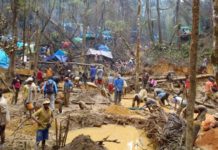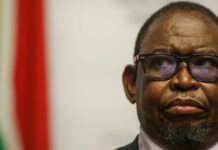
THE promise of a new mining cadastre did little to change investor attitudes to South African mining, according to the 2024 edition of the Fraser Institute’s mining companies survey, published in July.
Drawing on data collected in the second half of 2024, the survey received 350 responses from 2,289 individuals approached – a sample size of about 15.3%.
South Africa scored fractionally lower in overall attractiveness as a mining centre in 2024 compared to 2023 while normally less competitive jurisdictions did better.
Interestingly, Burkina Faso was considered a more attractive mining destination that South Africa even though the West African country is run by a military junta and has Jihadist insurgency operating within its borders.
Surprising, in a slightly different way, is data suggesting that investors don’t prize truly functioning democracies as much as mineral prospectivity. Guinea rates higher than South Africa. Russia ranks many places above South Africa. So does Zimbabwe and the Democratic Republic of Congo.
In July, mines minister Gwede Mantashe announced that the implementation of South Africa’s long-awaited digital and transparent mining rights system had been delayed again, with the new launch date now scheduled for October 2025.
Perhaps its imminence may motivate decision-makers to think differently about South Africa although it’s questionable. That’s because amendments to the Minerals and Petroleum Resources Development Act (MPRDA) gazetted in May – as they currently stand – has been billed as another government legislation disaster in the making.
A major concern of the amendments is they potentially open the door on the resetting of empowerment targets for mining companies. The department of minerals and petroleum rowed back on another amendment that asked junior miners to sell shares to empowerment targets but other aspects of the bill remain concerning.
Historic dumps created before May 1, 2004 that were previously processable without a mining right, now require one, for instance.
Quite what the 2026 edition of the Fraser Institute’s survey will make of this is anyone’s guess. For now, the data is concerning.
From a policy perception perspective, South Africa was in danger of disappearing from the radar. The country scored 19.47 on the index compared to 40.59 in 2023. This resulted in a ranking of 64th out of 86 countries included in the index – the lowest ranking in four years (which is as far back as the institute’s published data goes in the survey).
Cold comfort is Madagascar, Ethiopia, Mali, Mozambique all did worse than South Africa on this investment criteria. But then just across from South Africa’s border is Namibia which scored a sparkling 78.96. At least South Africa pipped one neighbour in the policy stakes: Zimbabwe scored 18.61.
Critics of the survey do point to the survey size but it’s worth remarking that respondents collectively represented $6bn worth of exploration spend.











